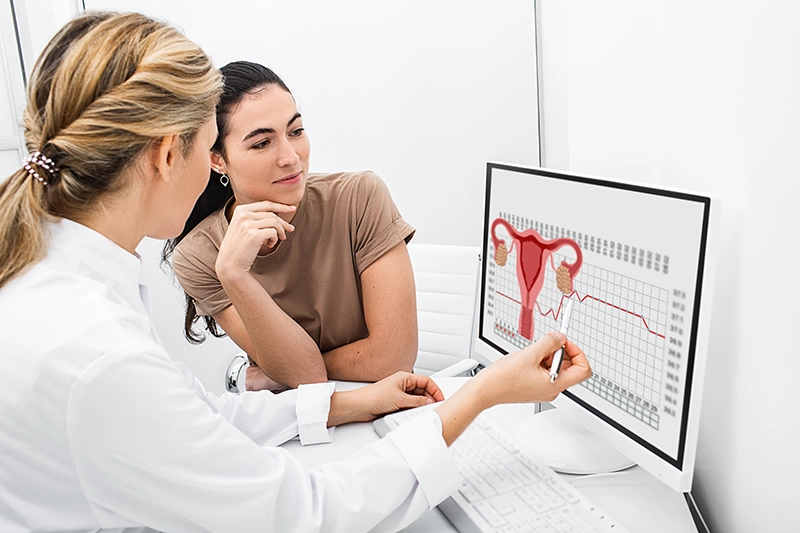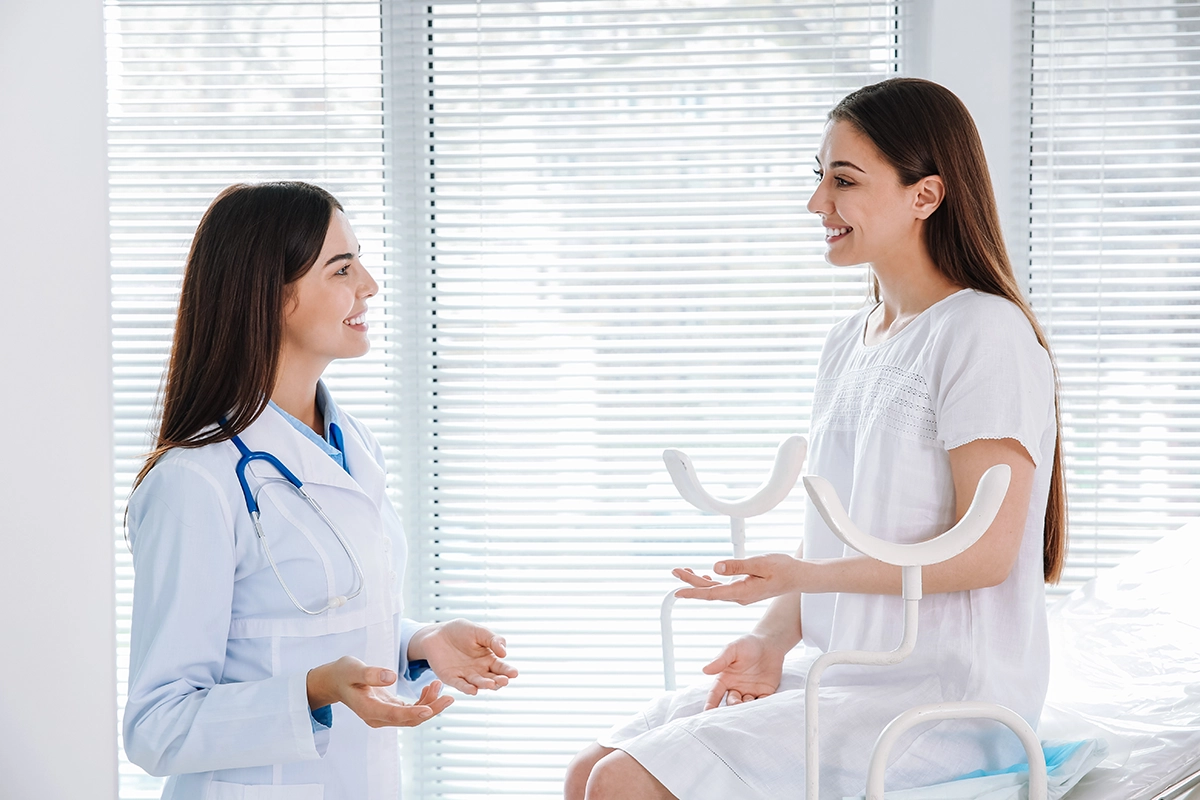Ovarian Health: How Anti-Müllerian Hormone and Estrogen Act in Human Reproduction
If you are seeking or undergoing assisted reproductive treatment, you should understand the importance of anti-Müllerian hormone (AMH) and estrogen, and how these influence the success of a pregnancy and ovarian health. ¹
The human body is a perfect machine, and understanding how it works allows us to better achieve any goal. Human reproduction is no exception.
In this blog, we will break down the key concepts involved in conception and how they relate to the success of pregnancy in reproductive medicine. ²
What is the Anti-Müllerian Hormone (AMH)?
AMH is produced by developing ovarian follicles, and its levels indicate the number of follicles in the ovaries that are still available for development—this is also known as ovarian reserve.
It is also an important factor in reproductive medicine, as abnormal levels can detect polycystic ovary syndrome (high levels) or premature ovarian failure (low levels).
Simply put, normal AMH levels indicate a higher likelihood of success when performing assisted reproductive techniques or help determine whether to consider an alternative option if results are not favorable.
During embryonic development, we know that males have XY chromosomes, while females have XX. AMH plays a role in defining the baby’s sex at a specific phase of gestation. ¹ ²
At birth, girls maintain low levels of AMH until puberty, when sexual maturity begins, and levels rise, marking the onset of menarche (the first menstrual period). From that point on, AMH allows the maturation of an egg each month to be fertilized.
Women are born with a set number of eggs, which decrease over time with each ovulation. As menopause approaches (the point when all eggs are depleted), AMH levels drop to zero. ³
For this reason, if you are seeking to conceive naturally, it is recommended to try while AMH levels are higher, and egg quality is better.
If you are considering postponing motherhood to a later stage of life, there is the option to preserve your eggs for future use. ⁴
Before undergoing reproductive treatment, it is advisable to check the health of your uterus, ovaries, and fallopian tubes through a series of specific tests. Among these tests is one to evaluate the number and quality of eggs available for fertilization. ² ⁵

Why is it advisable to perform the anti-Müllerian hormone test to improve ovarian health?
The AMH test is recommended because it helps determine several aspects of a patient’s health, including the progression of diseases like ovarian cancer or polycystic ovary syndrome (PCOS) in women, and testicular function in men. ⁵
If undergoing treatment for such conditions along with assisted reproductive techniques, AMH results help guide the progress of the treatment and consequently allow for better decisions on when and how to perform reproductive techniques with a higher success rate.
The test is simple: a blood sample is taken from the patient’s arm, with no special preparation needed.
How do the ovaries keep women healthy? ² ⁶
The ovaries send signals through various hormones to certain organs to keep their functioning stable. One of the most important is estrogen, which we’ll examine next.
Estrogen is produced during the menstrual cycle, peaking just before ovulation. Estrogen receptors are present throughout the body, amplifying the reach of the ovaries to ensure proper bodily function. ⁴ ⁷
For example, estrogen helps dilate blood vessels, reducing blood pressure, and in the brain, it has neuroprotective effects, aiding synaptic function. It also supports the musculoskeletal system in building and repairing muscles, as well as maintaining healthy bones.
During menopause, women need to be more cautious with their diet, rest, and exercise, as decreased estrogen levels make them more susceptible to diabetes, cardiovascular diseases, dementia, and osteoporosis. ³
The later menopause begins, the better the overall health and life expectancy. Just like AMH, estrogen is an indicator of body function and health. ⁷
In summary: AMH determines the number of follicles available, while estrogen prepares the endometrium for a possible pregnancy. This is a clear example of how these hormones work in unison during the reproductive phase.
Is it possible to boost fertility through lifestyle choices?
Experts offer various tips for women seeking to conceive, and natural remedies can significantly help those undergoing fertility treatment. ² ⁴
We recommend considering these brief tips to support your ovaries and hormones. ⁶
Some of the most important recommendations include avoiding caffeine, red meat (like beef and some poultry such as duck or goose), and processed foods (such as chips, chocolates, deli meats, or butter).
Stress is another factor that, when controlled, greatly facilitates conception and the development of a baby. Options like meditation, aromatherapy baths, and consulting with a mental health expert can help you conceive the newest, most anticipated member of your family. ⁵ ⁷
We hope this blog helps you better understand your body and how it works. This way, you can work with your doctor to choose the assisted reproductive method that best suits your current lifestyle.
What is UR Crea, and how can we help you if you have infertility problems?
At UR Crea Reproductive Medicine, we have over 30 years of experience. We offer various treatments such as in vitro fertilization, ovarian rejuvenation, egg donation, and the ROPA method, among others. For this reason, we perform a diagnostic protocol that is key to helping you.
Our network consists of a team of specialists in obstetrics-gynecology, reproductive biology, embryology, perinatology, anesthesiology, and nursing staff, all trained to care for our patients.
We nurture the dreams of those who yearn to be mothers and fathers. That’s why we provide a trusting environment based on the ethics and professionalism of our team, who offer personal and humane care. Come meet us!
References:
- WEFIV.com. What is Anti-Müllerian Hormone? https://wefiv.com/blog/que-es-hormona-antimulleriana-cual-es-su-utilidad/
- Elsevier. Anti-Müllerian Hormone as a Marker. https://www.elsevier.es/es-revista-revista-argentina-endocrinologia-metabolismo-185-articulo-la-hormona-antimulleriana-como-marcador-S0326461016300377
- National Geographic in Spanish. Is it Possible to Delay Menopause? https://www.nationalgeographic.es/ciencia/2024/05/menopausia-es-posible-retrasar-respuesta-podria-alargar-vida-mujeres
- MedlinePlus. Anti-Müllerian Hormone Test. https://medlineplus.gov/spanish/pruebas-de-laboratorio/prueba-de-la-hormona-antimulleriana/
- LabTestsOnline. Anti-Müllerian Hormone. https://www.labtestsonline.es/tests/hormona-antimulleriana-amh
- Mendoza-Celaya J. et al. Correlation Between Anti-Müllerian Hormone Levels and Age in Ovarian Recovery and Pregnancy Rates. https://www.scielo.org.mx/scielo.php?script=sci_arttext&pid=S0300-90412019000800007
- UR-Crea Web page. Fertility Preservation. https://ur-crea.mx/tratamiento/preservacion-de-la-fertilidad/







